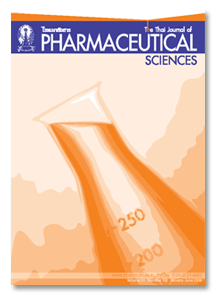ThaiScience
ThaiScience
THE THAI JOURNAL OF PHARMACEUTICAL SCIENCES
Volume 43, No. 01, Month JANUARY, Year 2019, Pages 14 - 20
Allium cepa extract attenuates ccl4-induced oxidative stress in rat brain
Israel Oghenevwodokohwo Okoro, Helen Ejiro Kadiri, Augusta Inegbedion
Abstract Download PDF
Introduction: Carbon tetrachloride (CCl4) has been used extensively to evaluate the probable mechanisms of toxicity in experimental animals. The CCl4-induced oxidative stress in rat brain has been established. This study aims to investigate the neuro-protective effect of Allium cepa extract administration to rats given a single dosage of CCl4 (1 ml/kg bw). Materials and Methods: Thirty rats were divided into five groups (I–V) containing six rats each. The plant (aqueous extract of A. cepa) was given at oral doses of 100 and 200 mg/kg day for 20 days after which CCl4 in olive oil vehicle (1 ml/kg bw) was administered to rats in Groups II-V. Thereafter, the brains were harvested for biochemical assays: Lipid peroxidation (LPO), glutathione (GSH) (reduced), glutathione reductase (GR), glutathione peroxidase (GPx), glutathione-S-transferase (GST), superoxide dismutase (SOD), and catalase (CAT) activities. Results: Elevated levels of LPO and reduced GSH activity were noted in the brain (forebrain, midbrain, and hindbrain) of rats (negative control group of rats) when compared to the positive control group. Equally, a severe decrease in the activities of GR, GST, CAT, GPx, and SOD in the brain of rats induced with CCL4 but not treated with the extract was noted. However, treatment with different doses of the extract significantly (P < 0.05) reversed the trends as was noticed in the extract-treated groups of rats when compared with the negative control group. Conclusion: This study indicates that extract of A. cepa possesses anti-neurotoxic effect in rats.
Keywords
Allium cepa, aqueous extract, carbon tetrachloride, neuroprotectiveTHE THAI JOURNAL OF PHARMACEUTICAL SCIENCES
Published by : Faculty of Pharmaceutical Sciences Chulalongkorn University
Contributions welcome at : http://www.pharm.chula.ac.th/tjps/
